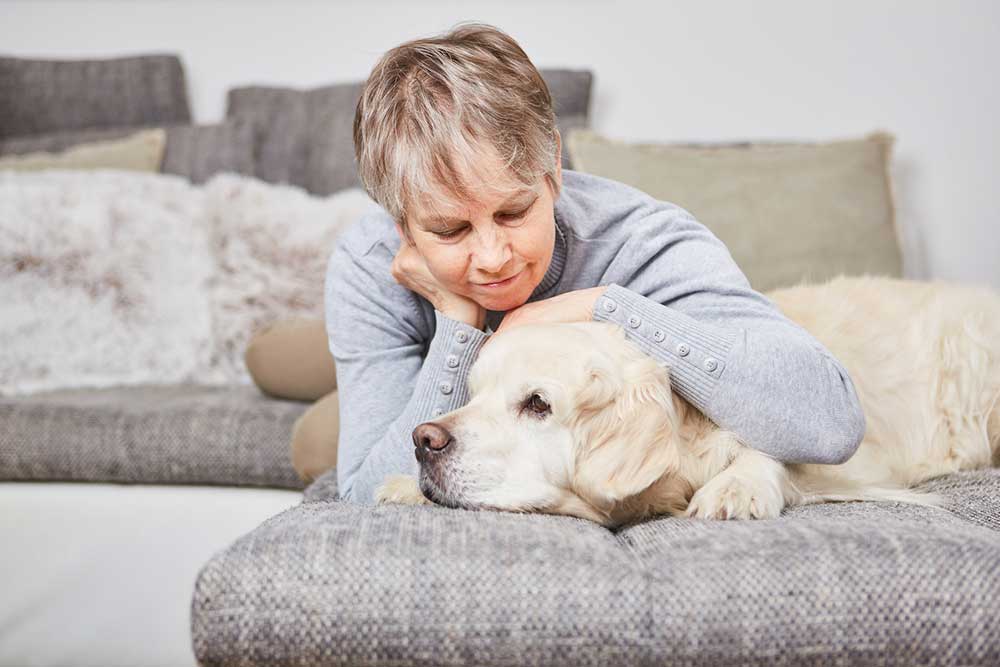There comes a time in every pet owner's life when we must consider making the difficult decision to say goodbye to a beloved pet. You may need to consider end-of-life care due to progressive or terminal illnesses such as cancer, old age or simply a declining quality of life. Knowing the signs a dog or other pet is dying can help guide your plans for your pet moving forward.
As you consider end-of-life care for your pet, there are several options to keep in mind to ensure comfort and care. Below are options to help make your final plans for your pet’s remaining time with you.
Palliative Care: Making Your Pet Comfortable at Home
Palliative care is a medical caregiving approach aimed at improving and maintaining the quality of life for both the patient and family members. It focuses primarily on relieving suffering from the symptoms of the illness and providing comfort, rather than treating the illness itself.1
Palliative care will not cure your pet's illness, but will help mitigate pain and suffering to improve your pet's quality of life in their final days. You can help provide palliative care for your pet at home in the following ways:
- Providing pain medications and other treatments as prescribed by your veterinarian for pain management.
- Providing extra bedding to cushion sore joints.
- Providing easy access to food and water so your pet does not need to get up.
- Assisting your pet to stand and go to the bathroom when needed (try using a towel as a sling to help your pet stand).
- Providing an appropriate diet as prescribed by your veterinarian.
Pet Hospice: Bringing in Extra Help
Some veterinarians, particularly those who offer mobile services or in-home euthanasia, may offer pet hospice services. Pet hospice involves providing palliative care and other veterinary care services to your pet at home. This saves pets and owners the stress of a trip to the veterinary clinic, particularly during the final days of a pet's life. Your hospice-care veterinarian may come to your home to administer palliative care treatments, assess your pet's quality of life and help you make important end-of-life care decisions for your pet.
Hospice care may not be available in all locations. Ask your veterinarian for recommendations for veterinary hospice care in your area.
Pet Euthanasia: Saying Goodbye
When it's time to say goodbye to your pet, you'll first need to decide where you'd like to have the euthanasia performed, if you choose this option. Many pet owners opt to bring their pet to the veterinary clinic for their final goodbyes. Others choose to have a mobile or in-home euthanasia veterinarian come to perform the euthanasia in their home. In-home euthanasia may not be an option in all areas, so be sure to discuss this with your veterinarian in advance and ask for local recommendations.
What to expect
Whichever option you choose, you can be sure that your pet will be in good hands. Prior to the procedure, it's okay to spoil your pet with all his or her favorite snacks and treats. Your veterinarian will first take some time to discuss the procedure with you and answer any questions you may have. Then, in many cases, your pet will be sedated prior to the procedure to ensure that he or she is unaware and does not feel any pain. Finally, your veterinarian will administer a medication to stop your pet's heart and allow your pet to die peacefully. Afterward, you should be allowed as much time as you need with your pet to say goodbye.
Euthanizing pets at home vs. in clinic
Some pet owners prefer in-home euthanasia because it is more cozy and natural and does not require moving a sick pet. Others prefer in-clinic euthanasia because the environment is more controlled and clinical, and they will not have memories of their pet dying in their home. Whichever option you choose, your pet should receive gentle loving care from your veterinarian, who should do everything to ensure a peaceful passing for your pet.
Humane euthanasia costs: at home vs. in clinic
Having humane euthanasia performed at home is more costly than having it performed in the veterinary clinic. This is because the in-home euthanasia veterinarian must take the time and resources to visit your home to perform the euthanasia. You may also need to pay the veterinarian's travel costs to reach your home.
In-home euthanasia typically costs between $200-$300.2 In-clinic euthanasia typically requires you to pay an exam fee and a euthanasia fee but does not involve extra costs such as travel fees. Pet owners should expect to pay approximately $100 to $300 for in-clinic euthanasia, depending on the size of the pet and the clinic's policies.3
Aftercare: Pet Cremation and/or Burial
After your pet's passing, you have several options as to how you'd like to handle your pet's remains. Many pet owners choose to take their pet's remains home for burial. This option is free and does not require any special equipment, but check your local laws to ensure pet burial is allowed in your area. Pets can also be buried in special pet cemeteries, which does incur an additional cost. This allows pet owners a place to visit their pet and a long-lasting memorial to their pet's memory.
Other pet owners choose cremation for their pet's remains. Cremation is the exposure of the body to high temperatures. The remains are then processed into cremains, more commonly called ashes. Pet owners can choose either communal cremation, in which the pet is cremated and interred along with other pets, or private cremation, in which the pet is cremated alone and the owners receive the ashes back in an urn. Private cremation is the most costly option for pet aftercare, but it allows pet owners to keep and cherish their pet's remains as long as they would like.
Pet Memorials: Remembering Your Pet
Pet memorials are available widely on the internet, and pet owners have many options to choose from. Whether it's a cemetery stone for a pet burial, a stepping-stone for the garden, an urn for a pet's ashes or cremation jewelry to carry your pet's ashes with you everywhere, you can find a variety of pet memorial products online and in some boutique pet stores. Prices vary widely depending on the type and size of the memorial and whether it is mass produced or custom-made especially for your pet. Whatever you are looking for, you're sure to find something perfect that will memorialize your treasured pet.
End of Life Pet Care Costs
Unfortunately, the end of life can be one of the most expensive times in a pet owner's journey. Veterinary treatments, hospice visits, euthanasia, aftercare and pet memorials can all add up to an expensive bill when all is said and done.
The CareCredit credit card is here to help when it is time to say goodbye to your beloved pet.* Whether it is your first veterinary visit or your last, CareCredit is here to help you manage the costs of your pet's care. Use the Acceptance Locator or download the CareCredit Mobile App to find a veterinary care provider near you who accepts the CareCredit credit card.
Saying Goodbye Is Never Easy
Saying goodbye to a beloved pet is one of the hardest things you'll ever have to do. It's normal to feel grief, sadness, anger, and overwhelm during this time. Know that you are not alone, and there are support systems that can help. Please reach out to the Pet Loss Support Hotline at the Tufts Cummings School of Veterinary Medicine or check out the other pet loss support resources available through Lap of Love.
Author Bio
Dr. Elizabeth Racine is a small animal general practice veterinarian and freelance writer. She covers both human and veterinary medicine with a special interest in nutrition, internal medicine, and veterinary behavior.







